Web of Social Relationships
VerifiedAdded on 2022/09/18
|7
|1551
|24
AI Summary
Contribute Materials
Your contribution can guide someone’s learning journey. Share your
documents today.
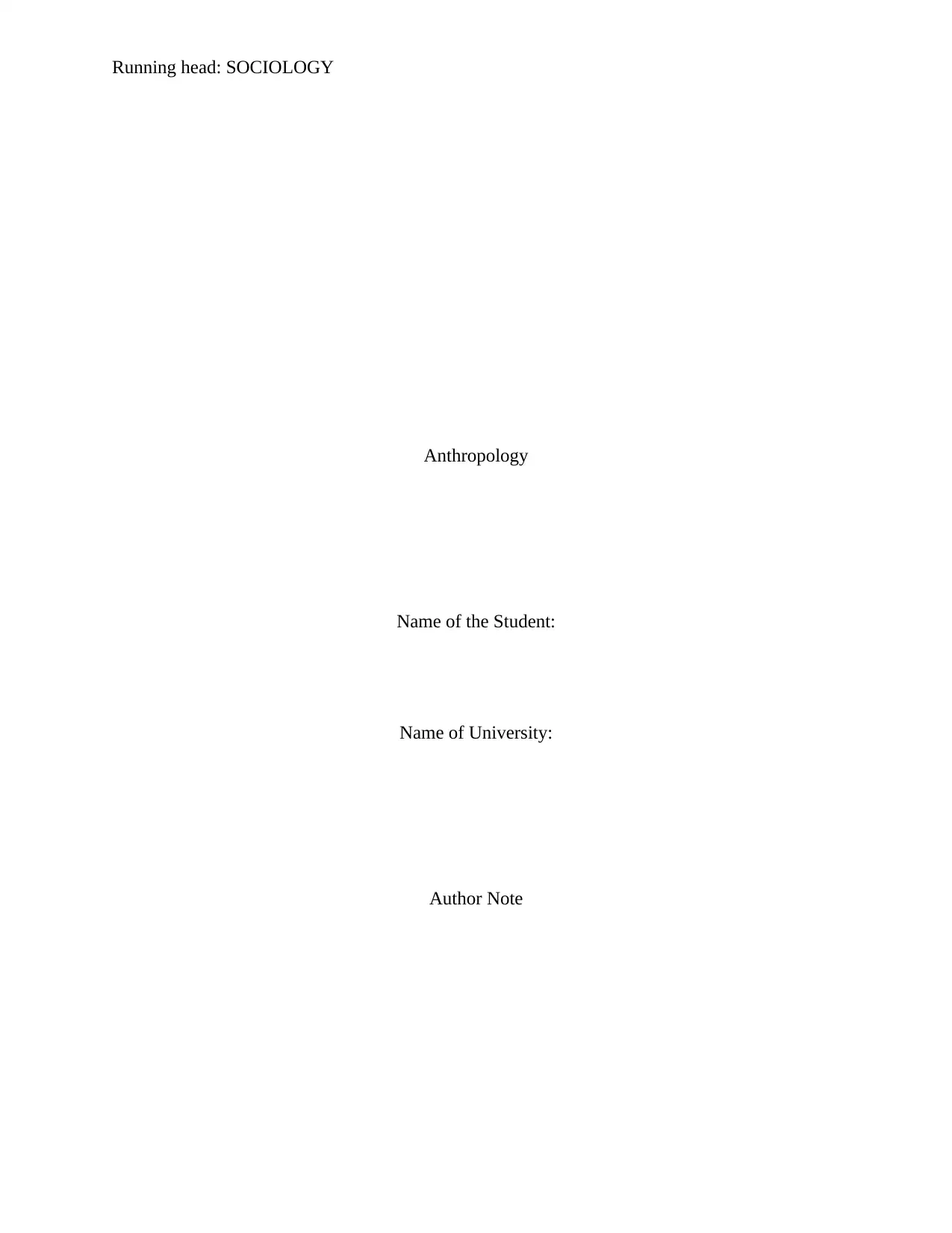
Running head: SOCIOLOGY
Anthropology
Name of the Student:
Name of University:
Author Note
Anthropology
Name of the Student:
Name of University:
Author Note
Secure Best Marks with AI Grader
Need help grading? Try our AI Grader for instant feedback on your assignments.
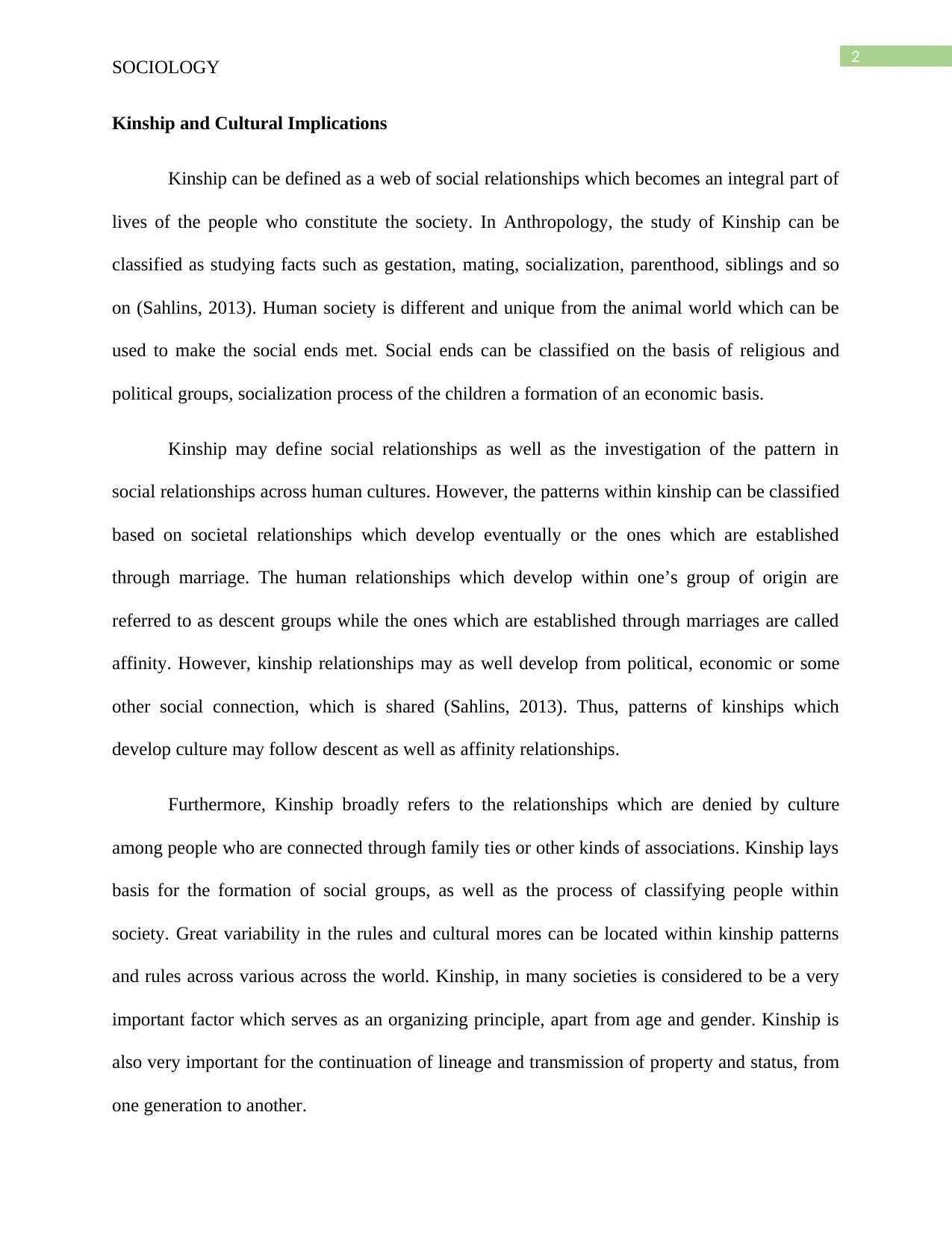
2
SOCIOLOGY
Kinship and Cultural Implications
Kinship can be defined as a web of social relationships which becomes an integral part of
lives of the people who constitute the society. In Anthropology, the study of Kinship can be
classified as studying facts such as gestation, mating, socialization, parenthood, siblings and so
on (Sahlins, 2013). Human society is different and unique from the animal world which can be
used to make the social ends met. Social ends can be classified on the basis of religious and
political groups, socialization process of the children a formation of an economic basis.
Kinship may define social relationships as well as the investigation of the pattern in
social relationships across human cultures. However, the patterns within kinship can be classified
based on societal relationships which develop eventually or the ones which are established
through marriage. The human relationships which develop within one’s group of origin are
referred to as descent groups while the ones which are established through marriages are called
affinity. However, kinship relationships may as well develop from political, economic or some
other social connection, which is shared (Sahlins, 2013). Thus, patterns of kinships which
develop culture may follow descent as well as affinity relationships.
Furthermore, Kinship broadly refers to the relationships which are denied by culture
among people who are connected through family ties or other kinds of associations. Kinship lays
basis for the formation of social groups, as well as the process of classifying people within
society. Great variability in the rules and cultural mores can be located within kinship patterns
and rules across various across the world. Kinship, in many societies is considered to be a very
important factor which serves as an organizing principle, apart from age and gender. Kinship is
also very important for the continuation of lineage and transmission of property and status, from
one generation to another.
SOCIOLOGY
Kinship and Cultural Implications
Kinship can be defined as a web of social relationships which becomes an integral part of
lives of the people who constitute the society. In Anthropology, the study of Kinship can be
classified as studying facts such as gestation, mating, socialization, parenthood, siblings and so
on (Sahlins, 2013). Human society is different and unique from the animal world which can be
used to make the social ends met. Social ends can be classified on the basis of religious and
political groups, socialization process of the children a formation of an economic basis.
Kinship may define social relationships as well as the investigation of the pattern in
social relationships across human cultures. However, the patterns within kinship can be classified
based on societal relationships which develop eventually or the ones which are established
through marriage. The human relationships which develop within one’s group of origin are
referred to as descent groups while the ones which are established through marriages are called
affinity. However, kinship relationships may as well develop from political, economic or some
other social connection, which is shared (Sahlins, 2013). Thus, patterns of kinships which
develop culture may follow descent as well as affinity relationships.
Furthermore, Kinship broadly refers to the relationships which are denied by culture
among people who are connected through family ties or other kinds of associations. Kinship lays
basis for the formation of social groups, as well as the process of classifying people within
society. Great variability in the rules and cultural mores can be located within kinship patterns
and rules across various across the world. Kinship, in many societies is considered to be a very
important factor which serves as an organizing principle, apart from age and gender. Kinship is
also very important for the continuation of lineage and transmission of property and status, from
one generation to another.
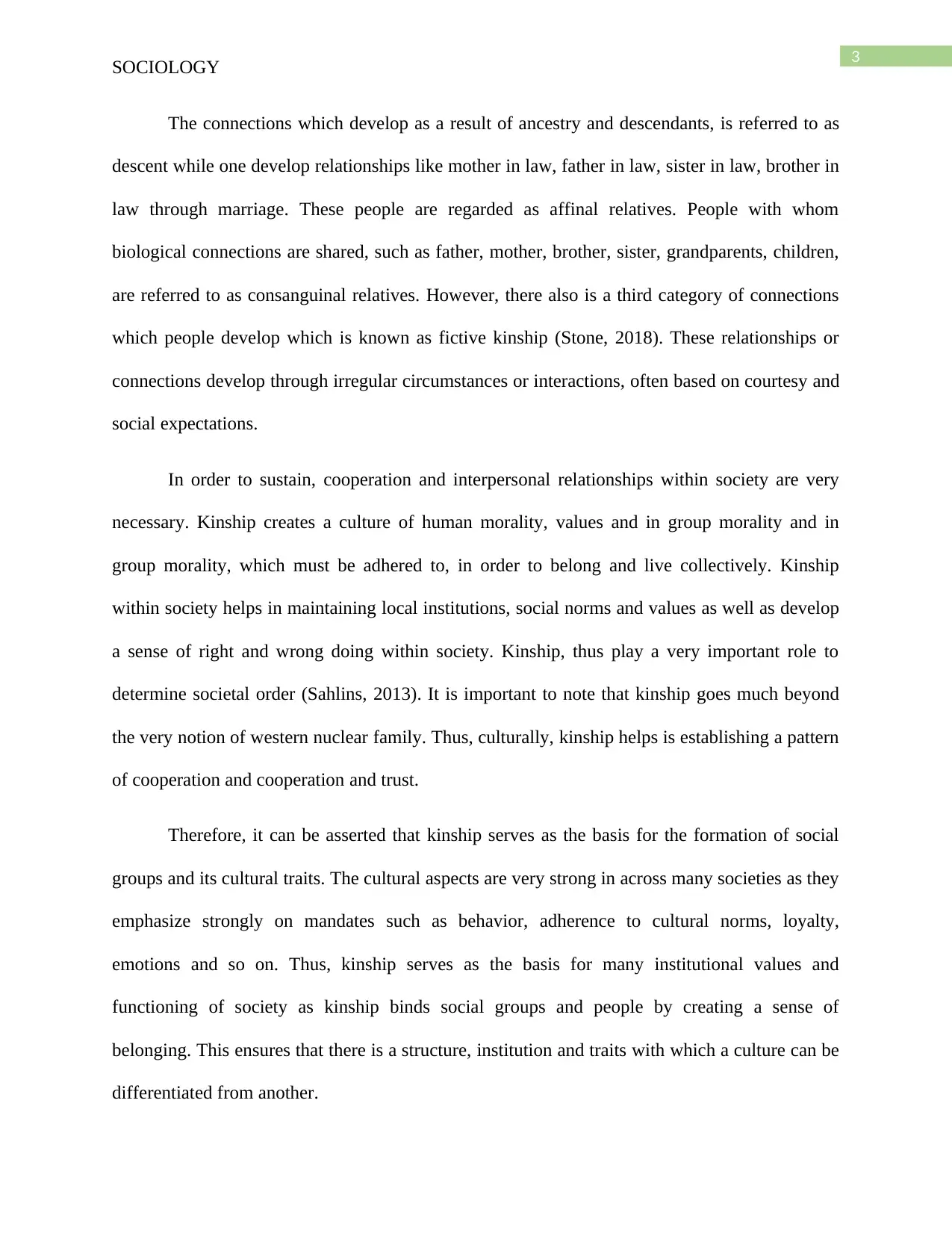
3
SOCIOLOGY
The connections which develop as a result of ancestry and descendants, is referred to as
descent while one develop relationships like mother in law, father in law, sister in law, brother in
law through marriage. These people are regarded as affinal relatives. People with whom
biological connections are shared, such as father, mother, brother, sister, grandparents, children,
are referred to as consanguinal relatives. However, there also is a third category of connections
which people develop which is known as fictive kinship (Stone, 2018). These relationships or
connections develop through irregular circumstances or interactions, often based on courtesy and
social expectations.
In order to sustain, cooperation and interpersonal relationships within society are very
necessary. Kinship creates a culture of human morality, values and in group morality and in
group morality, which must be adhered to, in order to belong and live collectively. Kinship
within society helps in maintaining local institutions, social norms and values as well as develop
a sense of right and wrong doing within society. Kinship, thus play a very important role to
determine societal order (Sahlins, 2013). It is important to note that kinship goes much beyond
the very notion of western nuclear family. Thus, culturally, kinship helps is establishing a pattern
of cooperation and cooperation and trust.
Therefore, it can be asserted that kinship serves as the basis for the formation of social
groups and its cultural traits. The cultural aspects are very strong in across many societies as they
emphasize strongly on mandates such as behavior, adherence to cultural norms, loyalty,
emotions and so on. Thus, kinship serves as the basis for many institutional values and
functioning of society as kinship binds social groups and people by creating a sense of
belonging. This ensures that there is a structure, institution and traits with which a culture can be
differentiated from another.
SOCIOLOGY
The connections which develop as a result of ancestry and descendants, is referred to as
descent while one develop relationships like mother in law, father in law, sister in law, brother in
law through marriage. These people are regarded as affinal relatives. People with whom
biological connections are shared, such as father, mother, brother, sister, grandparents, children,
are referred to as consanguinal relatives. However, there also is a third category of connections
which people develop which is known as fictive kinship (Stone, 2018). These relationships or
connections develop through irregular circumstances or interactions, often based on courtesy and
social expectations.
In order to sustain, cooperation and interpersonal relationships within society are very
necessary. Kinship creates a culture of human morality, values and in group morality and in
group morality, which must be adhered to, in order to belong and live collectively. Kinship
within society helps in maintaining local institutions, social norms and values as well as develop
a sense of right and wrong doing within society. Kinship, thus play a very important role to
determine societal order (Sahlins, 2013). It is important to note that kinship goes much beyond
the very notion of western nuclear family. Thus, culturally, kinship helps is establishing a pattern
of cooperation and cooperation and trust.
Therefore, it can be asserted that kinship serves as the basis for the formation of social
groups and its cultural traits. The cultural aspects are very strong in across many societies as they
emphasize strongly on mandates such as behavior, adherence to cultural norms, loyalty,
emotions and so on. Thus, kinship serves as the basis for many institutional values and
functioning of society as kinship binds social groups and people by creating a sense of
belonging. This ensures that there is a structure, institution and traits with which a culture can be
differentiated from another.

4
SOCIOLOGY
SOCIOLOGY
Secure Best Marks with AI Grader
Need help grading? Try our AI Grader for instant feedback on your assignments.
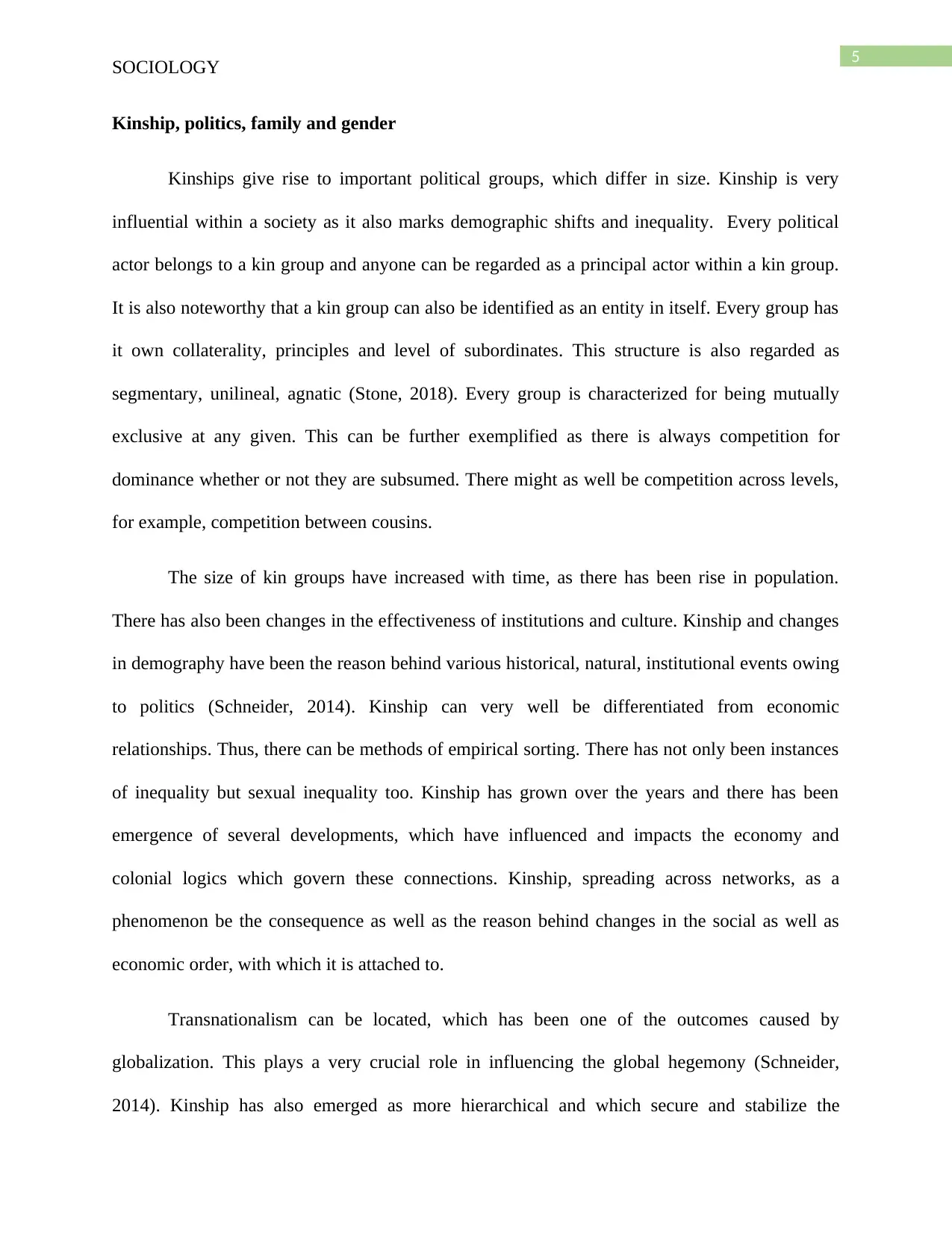
5
SOCIOLOGY
Kinship, politics, family and gender
Kinships give rise to important political groups, which differ in size. Kinship is very
influential within a society as it also marks demographic shifts and inequality. Every political
actor belongs to a kin group and anyone can be regarded as a principal actor within a kin group.
It is also noteworthy that a kin group can also be identified as an entity in itself. Every group has
it own collaterality, principles and level of subordinates. This structure is also regarded as
segmentary, unilineal, agnatic (Stone, 2018). Every group is characterized for being mutually
exclusive at any given. This can be further exemplified as there is always competition for
dominance whether or not they are subsumed. There might as well be competition across levels,
for example, competition between cousins.
The size of kin groups have increased with time, as there has been rise in population.
There has also been changes in the effectiveness of institutions and culture. Kinship and changes
in demography have been the reason behind various historical, natural, institutional events owing
to politics (Schneider, 2014). Kinship can very well be differentiated from economic
relationships. Thus, there can be methods of empirical sorting. There has not only been instances
of inequality but sexual inequality too. Kinship has grown over the years and there has been
emergence of several developments, which have influenced and impacts the economy and
colonial logics which govern these connections. Kinship, spreading across networks, as a
phenomenon be the consequence as well as the reason behind changes in the social as well as
economic order, with which it is attached to.
Transnationalism can be located, which has been one of the outcomes caused by
globalization. This plays a very crucial role in influencing the global hegemony (Schneider,
2014). Kinship has also emerged as more hierarchical and which secure and stabilize the
SOCIOLOGY
Kinship, politics, family and gender
Kinships give rise to important political groups, which differ in size. Kinship is very
influential within a society as it also marks demographic shifts and inequality. Every political
actor belongs to a kin group and anyone can be regarded as a principal actor within a kin group.
It is also noteworthy that a kin group can also be identified as an entity in itself. Every group has
it own collaterality, principles and level of subordinates. This structure is also regarded as
segmentary, unilineal, agnatic (Stone, 2018). Every group is characterized for being mutually
exclusive at any given. This can be further exemplified as there is always competition for
dominance whether or not they are subsumed. There might as well be competition across levels,
for example, competition between cousins.
The size of kin groups have increased with time, as there has been rise in population.
There has also been changes in the effectiveness of institutions and culture. Kinship and changes
in demography have been the reason behind various historical, natural, institutional events owing
to politics (Schneider, 2014). Kinship can very well be differentiated from economic
relationships. Thus, there can be methods of empirical sorting. There has not only been instances
of inequality but sexual inequality too. Kinship has grown over the years and there has been
emergence of several developments, which have influenced and impacts the economy and
colonial logics which govern these connections. Kinship, spreading across networks, as a
phenomenon be the consequence as well as the reason behind changes in the social as well as
economic order, with which it is attached to.
Transnationalism can be located, which has been one of the outcomes caused by
globalization. This plays a very crucial role in influencing the global hegemony (Schneider,
2014). Kinship has also emerged as more hierarchical and which secure and stabilize the
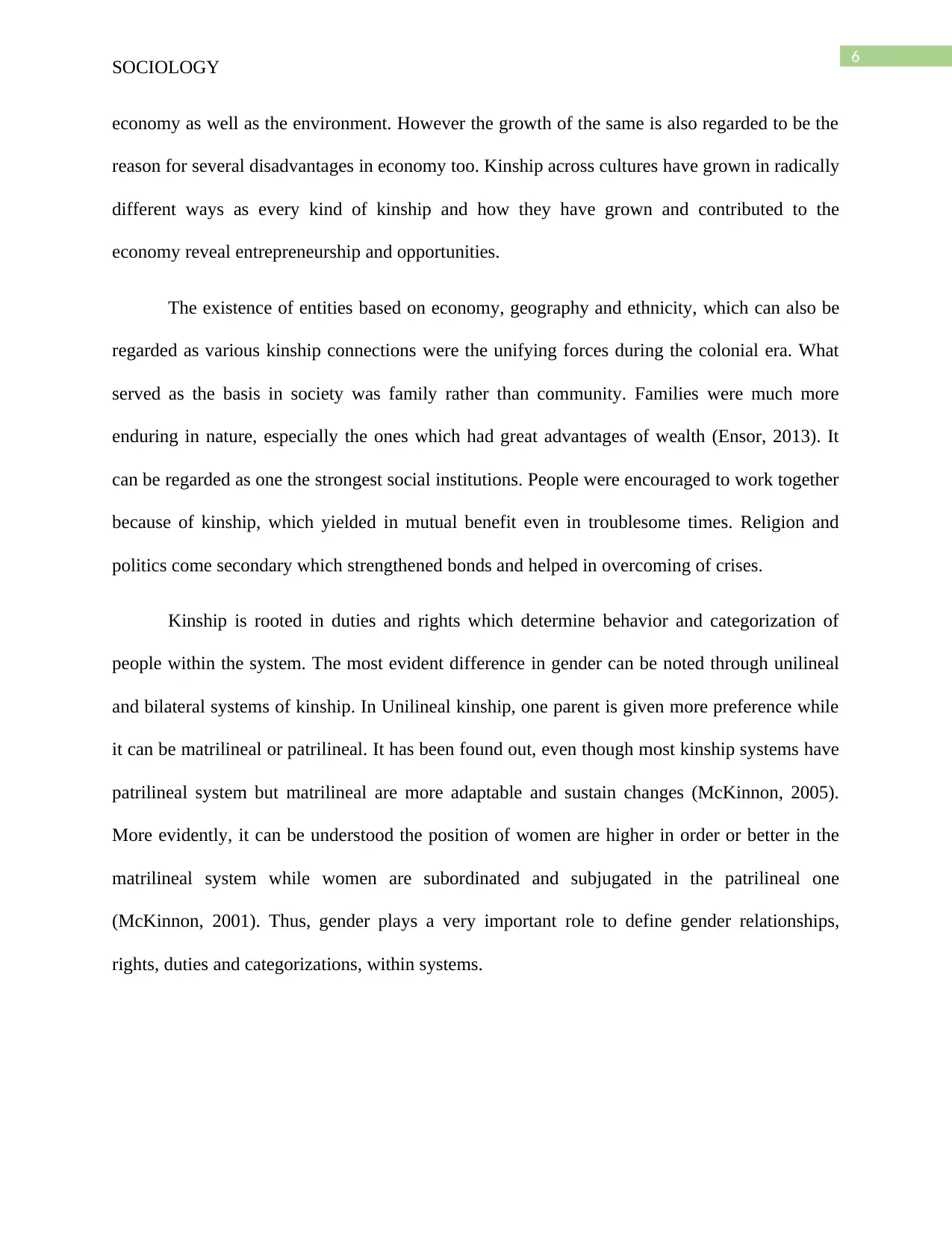
6
SOCIOLOGY
economy as well as the environment. However the growth of the same is also regarded to be the
reason for several disadvantages in economy too. Kinship across cultures have grown in radically
different ways as every kind of kinship and how they have grown and contributed to the
economy reveal entrepreneurship and opportunities.
The existence of entities based on economy, geography and ethnicity, which can also be
regarded as various kinship connections were the unifying forces during the colonial era. What
served as the basis in society was family rather than community. Families were much more
enduring in nature, especially the ones which had great advantages of wealth (Ensor, 2013). It
can be regarded as one the strongest social institutions. People were encouraged to work together
because of kinship, which yielded in mutual benefit even in troublesome times. Religion and
politics come secondary which strengthened bonds and helped in overcoming of crises.
Kinship is rooted in duties and rights which determine behavior and categorization of
people within the system. The most evident difference in gender can be noted through unilineal
and bilateral systems of kinship. In Unilineal kinship, one parent is given more preference while
it can be matrilineal or patrilineal. It has been found out, even though most kinship systems have
patrilineal system but matrilineal are more adaptable and sustain changes (McKinnon, 2005).
More evidently, it can be understood the position of women are higher in order or better in the
matrilineal system while women are subordinated and subjugated in the patrilineal one
(McKinnon, 2001). Thus, gender plays a very important role to define gender relationships,
rights, duties and categorizations, within systems.
SOCIOLOGY
economy as well as the environment. However the growth of the same is also regarded to be the
reason for several disadvantages in economy too. Kinship across cultures have grown in radically
different ways as every kind of kinship and how they have grown and contributed to the
economy reveal entrepreneurship and opportunities.
The existence of entities based on economy, geography and ethnicity, which can also be
regarded as various kinship connections were the unifying forces during the colonial era. What
served as the basis in society was family rather than community. Families were much more
enduring in nature, especially the ones which had great advantages of wealth (Ensor, 2013). It
can be regarded as one the strongest social institutions. People were encouraged to work together
because of kinship, which yielded in mutual benefit even in troublesome times. Religion and
politics come secondary which strengthened bonds and helped in overcoming of crises.
Kinship is rooted in duties and rights which determine behavior and categorization of
people within the system. The most evident difference in gender can be noted through unilineal
and bilateral systems of kinship. In Unilineal kinship, one parent is given more preference while
it can be matrilineal or patrilineal. It has been found out, even though most kinship systems have
patrilineal system but matrilineal are more adaptable and sustain changes (McKinnon, 2005).
More evidently, it can be understood the position of women are higher in order or better in the
matrilineal system while women are subordinated and subjugated in the patrilineal one
(McKinnon, 2001). Thus, gender plays a very important role to define gender relationships,
rights, duties and categorizations, within systems.
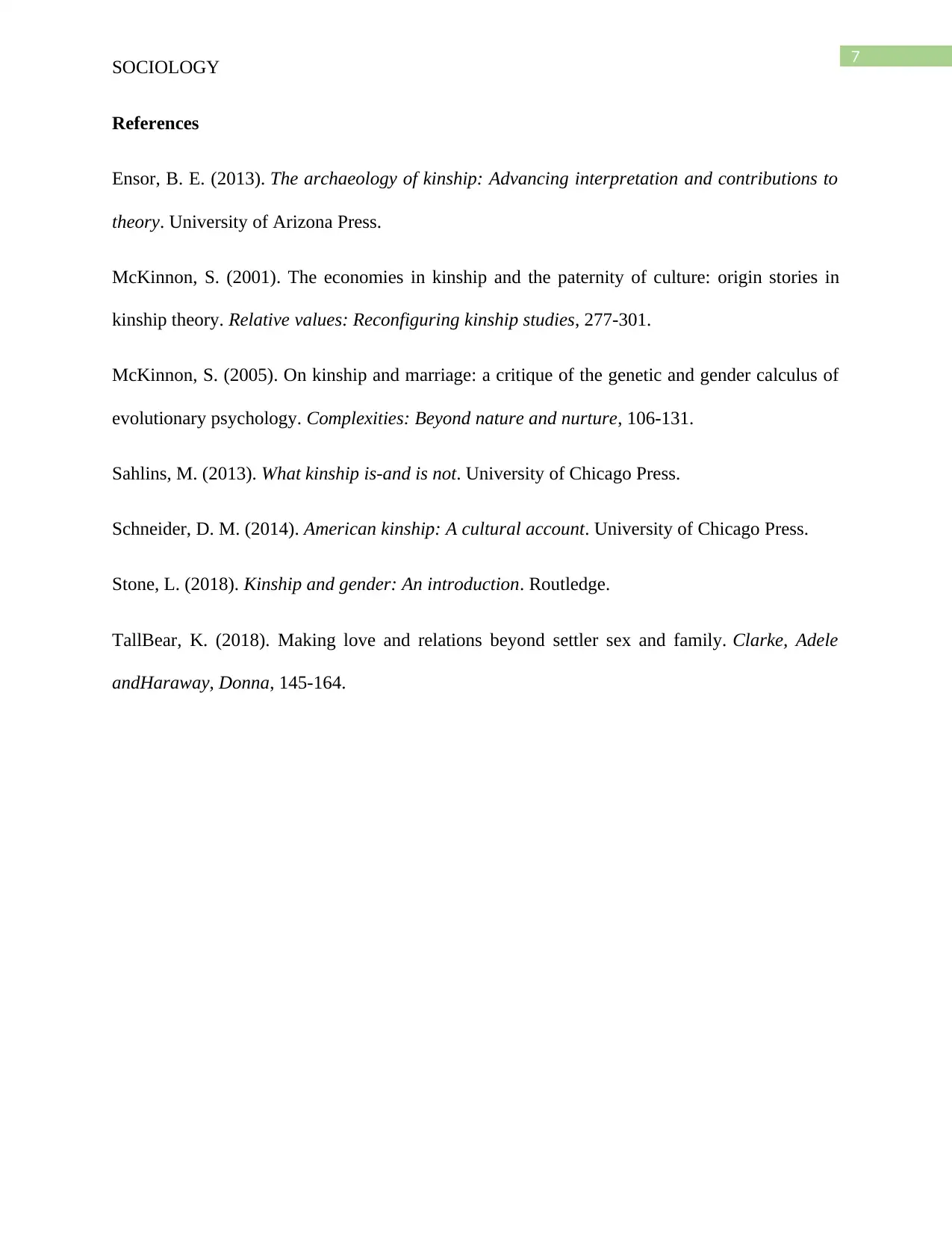
7
SOCIOLOGY
References
Ensor, B. E. (2013). The archaeology of kinship: Advancing interpretation and contributions to
theory. University of Arizona Press.
McKinnon, S. (2001). The economies in kinship and the paternity of culture: origin stories in
kinship theory. Relative values: Reconfiguring kinship studies, 277-301.
McKinnon, S. (2005). On kinship and marriage: a critique of the genetic and gender calculus of
evolutionary psychology. Complexities: Beyond nature and nurture, 106-131.
Sahlins, M. (2013). What kinship is-and is not. University of Chicago Press.
Schneider, D. M. (2014). American kinship: A cultural account. University of Chicago Press.
Stone, L. (2018). Kinship and gender: An introduction. Routledge.
TallBear, K. (2018). Making love and relations beyond settler sex and family. Clarke, Adele
andHaraway, Donna, 145-164.
SOCIOLOGY
References
Ensor, B. E. (2013). The archaeology of kinship: Advancing interpretation and contributions to
theory. University of Arizona Press.
McKinnon, S. (2001). The economies in kinship and the paternity of culture: origin stories in
kinship theory. Relative values: Reconfiguring kinship studies, 277-301.
McKinnon, S. (2005). On kinship and marriage: a critique of the genetic and gender calculus of
evolutionary psychology. Complexities: Beyond nature and nurture, 106-131.
Sahlins, M. (2013). What kinship is-and is not. University of Chicago Press.
Schneider, D. M. (2014). American kinship: A cultural account. University of Chicago Press.
Stone, L. (2018). Kinship and gender: An introduction. Routledge.
TallBear, K. (2018). Making love and relations beyond settler sex and family. Clarke, Adele
andHaraway, Donna, 145-164.
1 out of 7
Related Documents
Your All-in-One AI-Powered Toolkit for Academic Success.
+13062052269
info@desklib.com
Available 24*7 on WhatsApp / Email
![[object Object]](/_next/static/media/star-bottom.7253800d.svg)
Unlock your academic potential
© 2024 | Zucol Services PVT LTD | All rights reserved.





